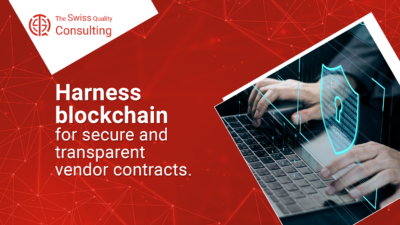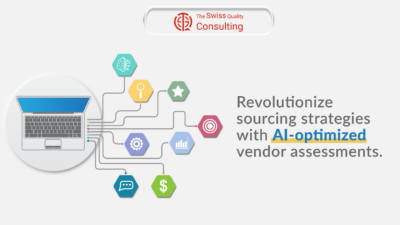Revolutionizing Vendor Agreements with Blockchain Technology
Introduction
In the ever-evolving world of business technology, harnessing blockchain for secure and transparent vendor contracts is emerging as a game-changer. Aimed at business executives, mid-level managers, and entrepreneurs, this article explores how blockchain technology is transforming the way businesses handle vendor contracts, ensuring security and transparency.
The Advantages of Blockchain in Vendor Contracts
In today’s intricate and data-driven business landscape, blockchain technology has emerged as a transformative force, revolutionizing the way organizations manage and secure vendor contracts. Unlike traditional paper-based contracts that are susceptible to errors, fraud, and disputes, blockchain-based smart contracts offer an unparalleled level of security, transparency, and immutability, fostering trust, efficiency, and streamlined collaboration between businesses and their vendors.
The cornerstone of blockchain’s transformative power lies in its decentralized nature, a paradigm shift from centralized, trust-based systems to a distributed, trustless environment. This decentralized ledger eliminates the need for intermediaries, such as banks or legal authorities, to verify and maintain contractual records. Instead, the blockchain serves as a distributed database, replicating contractual data across multiple nodes, ensuring that every participant in the network has access to the same, immutable record of transactions and agreements.
This immutability, a hallmark of blockchain technology, safeguards contractual data from unauthorized alterations or tampering. Once recorded on the blockchain, contractual terms become tamper-proof, ensuring that all parties involved adhere to the agreed-upon terms, minimizing the risk of disputes, and fostering trust and confidence in business dealings.
The transparency of blockchain-based smart contracts extends beyond immutability, providing all authorized stakeholders with real-time visibility into the contractual execution process. Every transaction, from initial negotiation to final payment, is recorded on the blockchain, creating an auditable trail that is accessible to all relevant parties. This transparency fosters accountability, streamlines communication, and facilitates timely dispute resolution.
By embracing blockchain technology for vendor contract management, organizations can reap a multitude of benefits, including:
Enhanced security and fraud prevention: Blockchain’s immutability and cryptographic security safeguard contracts from unauthorized alterations, minimizing the risk of fraud and ensuring the integrity of contractual data.
Improved contract visibility and traceability: The transparent nature of blockchain provides all authorized stakeholders with real-time visibility into contract execution, enabling proactive monitoring and timely dispute resolution.
Streamlined contract management and execution: Smart contracts automate contract execution, reducing manual processing, minimizing errors, and expediting the overall contract lifecycle.
Reduced costs and intermediaries: Blockchain eliminates the need for intermediaries, such as banks or legal authorities, to verify and maintain contracts, reducing transaction costs and streamlining administrative processes.
Enhanced trust and collaboration: Blockchain’s security, transparency, and immutability foster trust and confidence between businesses and their vendors, promoting stronger relationships and collaborative partnerships.
In essence, blockchain technology is not merely a technological advancement; it is a transformative force that is reshaping the way organizations manage vendor contracts. By embracing blockchain’s decentralized, secure, and transparent nature, businesses can streamline contract management processes, enhance trust and collaboration with vendors, and achieve operational excellence in today’s interconnected and data-driven business landscape.
Ensuring Contractual Integrity and Trust
With blockchain, every transaction and contractual change is recorded on a distributed ledger, offering a transparent and tamper-proof record, thereby building trust among all parties involved.
Role in Change Management
Implementing blockchain for vendor contracts is a vital aspect of change management in modern businesses. It signifies a shift from traditional contract management methods to more secure, efficient, and transparent practices, keeping pace with technological advancements.
Adapting to Innovative Contractual Practices
Adopting blockchain technology in contract management requires businesses to embrace new methodologies, reflecting their commitment to innovation and forward-thinking practices.
Impact on Executive Coaching and Leadership
Effective leadership is crucial in integrating blockchain into vendor contracts. Executive coaching services are increasingly focusing on equipping leaders with the knowledge and skills necessary to navigate and manage blockchain-based contract systems.
Leadership in the Age of Blockchain
Through executive coaching, leaders learn to understand the intricacies of blockchain technology and how it can be leveraged to enhance contract management and business relationships.
Effective Communication of Blockchain Benefits
Effectively communicating the benefits of blockchain technology in vendor contracts is essential for its successful implementation. It involves educating stakeholders about how blockchain enhances security, transparency, and efficiency.
Building a Blockchain-Informed Business Environment
Communicating the strategic advantages of blockchain in contract management fosters a culture of innovation and technological adaptability within the organization.
Generative AI in Complementing Blockchain Technology
Generative Artificial Intelligence (AI) complements blockchain technology in vendor contracts. AI algorithms can analyze blockchain data to provide insights, predict trends, and optimize contract management processes.
Enhancing Contractual Processes with AI and Blockchain
The combination of generative AI and blockchain technology offers a powerful tool for businesses, enabling smarter, data-driven decisions in contract management.
Conclusion Harnessing Blockchain for Secure and Transparent Vendor Contracts
In conclusion, harnessing blockchain for secure and transparent vendor contracts represents a significant technological stride for businesses seeking enhanced security, transparency, and efficiency. By embracing blockchain technology, companies can revolutionize their contractual processes, build stronger vendor relationships, and maintain a competitive edge in the digital age.
#BlockchainTechnology, #VendorContracts, #BusinessInnovation, #DigitalTransformation, #SecureContracting























